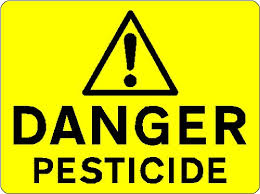Everything put down household drains is carried by sewer lines to wastewater water treatment plants whether that plant is equipped to treat it or not. This is why it is inappropriate, illegal in fact, to put chemicals like pesticides down household drains.
Tests show that even one teaspoon of the pesticide Diazinon® down a sink or toilet can injure or kill the microorganisms used to monitor water quality. Pesticide use has increased because of the explosion in the population and there is no doubt that it can harm the environment as well as the health of the people.
For alternatives to pesticides, visit with a nursery representative or county extension agent.
Additionally, keep in mind that even when pesticides are used correctly, runoff can carry small amounts to other locations including rivers, streams, lakes and drinking water.
Because of the danger to the water system, homeowners and commercial property owners should use and dispose of pesticides properly. The following tips are offered by the North Texas Municipal Water District:
- Triple-rinse application and mixing equipment and empty all used containers outdoors where the pesticide is used.
- Dispose of rinse water by using during application to lawn.
- Use less toxic methods of control when possible.
- Apply pesticides only when necessary and less toxic methods are ineffective.
- Mix only the amount of pesticide needed to treat a specific area.
- Plan application so pesticides will not be washed away by rain. Apply well before it rains or wait until it stops raining.
- Do not dump excess pesticides or rinse water down storm drains or household drains.
- Use pesticides according to label directions.
In addition to correct application and disposal, storage is another concern. Always store pesticides in locked shed where animals and children cannot access them. The shed should have a concrete floor to prevent seepage into soil.
Source: www.ntmwd.com


